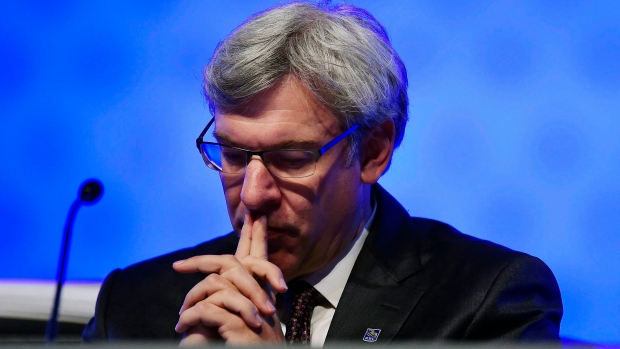Jun 15, 2018
Should CEOs stand up for Canadian trade and risk Trump’s scorn?

After a number of harsh verbal attacks on Canada and Prime Minister Justin Trudeau by U.S. President Donald Trump and his aides, some Canadian business leaders may now face a tough choice: Stay silent on trade tensions that eat into profits or speak out at the risk of facing Trump’s scorn.
Trump slammed Trudeau after the Group of Seven (G7) summit in Charlevoix, Que. came to a close last Saturday, calling him “meek,” “dishonest” and “weak.” The president’s tweets were in response to Trudeau reiterating that Canada “will not be pushed around” and would proceed with retaliatory tariffs against U.S. steel and aluminum levies.
Trump’s top aides later added to the insults, with White House trade adviser Peter Navarro even saying there’s a “special place in hell” for Trudeau.
Business leaders in Canada stayed largely silent immediately after the heated G7 exchange, but according to some public relations experts that may be a mistake.
“The government needs to know it’s moving forward with the confidence that they have the business sector behind them,” said Peter Donolo, vice chairman of Hill+Knowlton Strategies Canada, in a phone interview with BNN Bloomberg.
“Broadly speaking, I think this is a good time for [Canadian businesses] to show their Canadian identity — companies that want to be seen particularly as Canadian champions.”
But it’s not hard to see why CEOs may be reluctant to stand up for Canada, given the commercial risks for companies and how much Canadian firms rely on the U.S. market.
“If there’s self-censorship going on here with Canadian CEOs, it is possible that those with major operations in the U.S. — perhaps banks, food companies, railways — may have been muted by Trump’s intimidation tactics,” Bob Pickard, principal with Signal Leadership Communication, said in an interview by email.
“Their operations south of the border could be severely impacted by capricious legislative and discretionary regulatory initiatives that a scorned American president could propel.”
This is where leaders of business associations can play a pivotal role, and the Business Council of Canada’s John Manley and Canadian Chamber of Commerce’s Perrin Beatty have “commented colourfully,” Pickard said.
- Trump aide Navarro apologizes for 'inappropriate' Trudeau comments
- Ford vows to 'stand side by side' with Trudeau on trade despite other issues
- Leaders weigh in on the Trudeau-Trump G7 blowup
RELATED: U.S.-CANADA TRADE RELATIONS
At the same time, executive communication strategies are shifting. Pickard said brands are increasingly taking stands on tough issues beyond their organizations’ mandate — at least in the U.S.
“Companies are now expected to communicate authentically like real people rather than robotically as ‘things,’ so the best way to achieve such PR personification is through the communication of the chief executive,” Pickard said. “This tendency is so far much less prevalent here in Canada, so cultural inhibition and a lack of efficacy may also be playing a role here.”
Still, that did not stop Royal Bank of Canada chief executive David McKay and Honda Canada president Dave Gardner to voice their support for Trudeau standing firm on trade with the U.S. Gardner’s use of “highly charged” language like “NAFTA war” in a June 13 Globe and Mail article will command media attention to Honda’s concern for jobs and the auto industry, Pickard said.
Other Canadian business leaders who remain silent may miss out on a golden opportunity to strike a deal with the government. Donolo said he’s surprised that Canadian businesses have been “consistently kind of tone deaf” on this front.
“A canny approach would be to say, listen we’re square behind the government on the position of tariffs and trade with the U.S., but we also need the government to help make us a much more robust export economy by improving the tax situation vis-a-vis other jurisdictions,” Donolo said.
“To say, okay government, we’ll help you on a, b, c and d — but you need to come through for us on e, f and g.”







